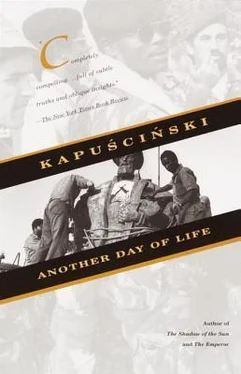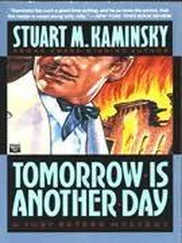Benguela: a sleepy, almost depopulated city slumbering in the shade of acacias, palms, and kipersols. The villa neighborhoods are empty, the houses locked up and drowned in flowers. Indescribable residential luxury, a dizzying excess of floor space and, in the streets before the gates, orphaned cars — Chevrolets and Alfa Romeos and Jaguars, probably in running order although nobody tries to drive them. And nearby, a hundred meters away, the desert — white and glimmering like a salt spill, without a blade of grass, without a single tree, beyond redemption. In this desert lie African settlements stuck together lackadaisically with clay and dung, hammered out of plywood and tin, swarming, stuffy, and miserable. Although the two worlds — comfort and poverty — stand only steps apart and no one is guarding the rich European neighborhood, the blacks from the clay huts haven’t tried to move in. The idea hasn’t crossed their minds. This might be the best explanation of their passive attitude. Because moral scruples don’t come into play here, nor a fear that the whites will return and avenge themselves. These considerations might have been weighed, had they been tempted to take over the white quarters. But in these people’s lives, the degree of consciousness that drives one to demand justice or do something about obtaining it hasn’t yet been reached. Only those Africans who have acquired a university education, who have learned to read, got out into the world, and seen films — only they understand that decolonization has created a chance for rapid material advancement, for accumulating wealth and privileges. And taking advantage of the chance has come easily to them precisely because their less enlightened brothers — who are a dime a dozen — demand nothing for themselves, accepting their clay hut and bowl of manioc as the only world they will ever know or desire.
I spent some time walking the border of the two quarters, and then I went downtown. I found the lane in which the central-front staff was quartered in a spacious two-story villa. In front of the gate sat a guard with a face monstrously swollen by periostitis, groaning and squeezing his head, obviously terrified that his skull would burst. There was no way to communicate with such an unfortunate; nothing existed for him at that point. I opened the gate. In the garden, boxes of ammunition, mortar barrels, and piles of canteens lay on the flowerbeds in the shade of flaming bougainvilleas. Farther on, soldiers were sleeping side by side on the veranda and in the hall. I went upstairs and opened a door. There was nothing but a desk inside, and at the desk sat a large, powerfully built white man: Comandante Monti, the commander of the front.
He was typing a request to Luanda for people and weapons. The only armored personnel carrier he had at the front had been knocked out the day before by a mercenary. If the enemy attacked now with their own armored personnel carrier, he would have to give ground and retreat.
Monti read the letter that I had brought him from Luanda, ordered me to sit down — on the windowsill, because there were no chairs — and went on typing. A quarter of an hour later there were footsteps on the stairs and four people came in, a television crew from Lisbon. They had come here for two days and afterward they would return to Portugal in their plane. The leader of the crew was Luis Alberto, a dynamic and restless mulatto, sharp and gusty. We immediately became friends. Monti and Alberto knew each other from way back, since they both came from Angola and perhaps even from right here in Benguela. So we didn’t have to waste any time making introductions and getting to know one another.
Alberto and I wanted to drive to the front, but the rest of the crew — Carvalho, Fernandez, and Barbosa — were against it. They said they had wives and children, they had begun building houses outside Lisbon (near Cascais, a truly beautiful spot), and they weren’t going to die in this mad, senseless war in which nobody knew anything, the opponents couldn’t tell each other apart until the last second, and you could be blown away without any fighting, simply because of the crazy screwups, the lack of information, the laziness and callousness of blacks for whom human life had no value.
In other words, they expressed a desire to live.
A discussion began, which is what Latins love most of all. Alberto tried to sell them on the argument that they would shoot a lot of tape and make a lot of the money they all needed so badly. But it was Monti who finally assuaged them by saying that at that time of day — it was almost noon — there was no fighting on the front. And he gave the most straightforward explanation in the world: “It’s too hot.”
Outside the window the air was rippling like tin in a forge; every movement demanded effort. We started getting ready to hit the road. Monti went downstairs, woke up one of the soldiers, and sent him into town where, somewhere, there were drivers and cars. A Citroën DS and a Ford Mustang turned up. Monti wanted to make it nice for us, so as our escort he designated a soldier named Carlotta.
Carlotta came with an automatic on her shoulder. Even though she was wearing a commando uniform that was too big for her, you could tell she was attractive. We all started paying court to her immediately. In fact, it was Carlotta’s presence that persuaded the crew to forget about their houses outside Lisbon and travel to the front. Only twenty years old, Carlotta was already a legend. Two months earlier, during the uprising in Huambo, she had led a small MPLA detachment that was surrounded by a thousand-strong UNITA force. She managed to break the encirclement and lead her people out. Girls generally make excellent soldiers — better than boys, who sometimes behave hysterically and irresponsibly at the front. Our girl was a mulatto with an elusive charm and, as it seemed to us then, great beauty. Later, when I developed the pictures of her, the only pictures of Carlotta that remained, I saw that she wasn’t so beautiful. Yet nobody said as much out loud, so as not to destroy our myth, our image of Carlotta from that October afternoon in Benguela. I simply looked up Alberto, Carvalho, Fernandez, and Barbosa and showed them the pictures of Carlotta taken on the way to the front. They looked at them in silence and I think we all chose silence so we wouldn’t have to comment on the subject of good looks. Did it mean anything in the end? Carlotta was gone by then. She had received an order to report to the front staff, so she put on her uniform, combed out her Afro, slung the automatic over her shoulder, and left. When Comandante Monti, four Portuguese, and a Pole saw her in front of staff headquarters, she seemed beautiful. Why? Because that was the kind of mood we were in, because we needed it, because we wanted it that way. We always create the beauty of women, and that day we created Carlotta’s beauty. I can’t explain it any other way.
The cars moved out and drove along the road to Balombo, 160 kilometers to the east. To tell the truth, we all should have died on the winding road, full of switchbacks that the drivers took like madmen; it was a miracle that we got there alive. Carlotta sat beside the driver in our car and, since she was used to that kind of driving, she kidded us a little. The force of the wind threw her head back, and Barbosa said he would hold on to Carlotta’s head so the wind wouldn’t tear it off. Carlotta laughed, and we envied Barbosa. At one of the stops, Fernandez proposed that Carlotta move to the back with us and sit on our knees, but she refused. We rejoiced out loud at his defeat. After all, Fernandez had clearly wanted Carlotta to sit on his own lap, which would have ruined everything since she didn’t belong to anyone and we were creating her together, our Carlotta.
Читать дальше











